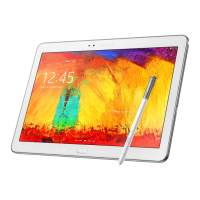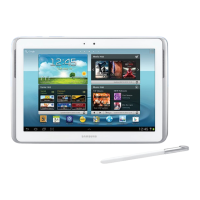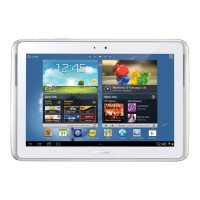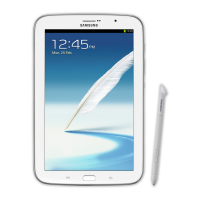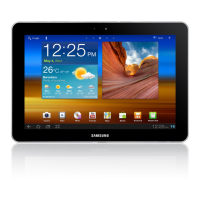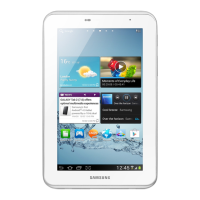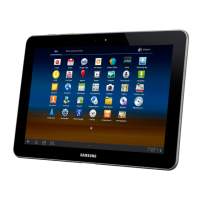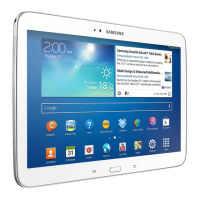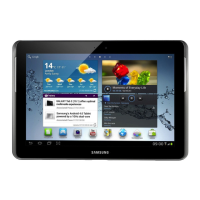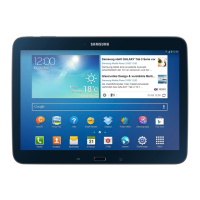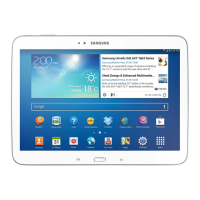Do you have a question about the Samsung GT-N8010 and is the answer not in the manual?
Important safety precautions and usage guidelines before operating the device.
Explains symbols used in the manual for warnings, cautions, and notes.
Lists registered trademarks and logos associated with the device.
Instructions for checking the contents of the product box upon purchase.
Steps and precautions for charging the device's built-in battery.
Guide on how to insert and format an optional memory card for expanded storage.
Procedures for powering the device on, off, and switching to Flight mode.
Identifies and explains the physical layout and components of the device.
Details on safely using the touch screen and the S Pen for interaction.
Overview of the device's Home screen layout, including icons and the system bar.
Instructions on how to open and manage applications, including the task manager.
Options for personalizing device settings like language, time, and volume.
Methods for text input, including virtual keypad, voice, and handwriting.
Introduces fundamental interactions using the S Pen on the device's touch screen.
Explains advanced gestures and functions performed with the S Pen.
Step-by-step guide on how to replace a worn S Pen tip for optimal performance.
Describes how to use device motion recognition for enhanced control and interaction.
Instructions on switching to and using the handwriting input feature for easier text entry.
Guide on creating and managing notes using various templates and multimedia content.
How to create quick notes with text and sketches from any screen.
Guide to organizing schedules and tasks using the S Planner application.
Instructions on creating and using custom gestures for quick command execution.
Learn to access and bookmark favorite web pages using the device's browser.
Accessing and playing games through the Game Hub application.
Downloading and installing applications from the Google Play Store.
Viewing and uploading videos using the YouTube application.
Using Google Maps for location services, searching, and getting directions.
Searching for places or businesses in your vicinity.
Using GPS for turn-by-turn voice-guided navigation.
Discovering and downloading applications optimized for the device.
Searching for information on the device or the internet using Google search.
Managing and sending email messages through the Google Mail service.
Setting up and managing personal or company email accounts.
Instructions for chatting with friends and family using Google Talk.
Sending and receiving instant messages via the ChatON application.
Using Google+ messenger for instant messaging.
Accessing Google's social network service for sharing and communication.
Listening to music, managing playlists, and customizing playback settings.
Accessing an online music store to buy songs and manage music files.
Capturing photos and videos with the device's camera.
Step-by-step guide on taking photos, including using camera shortcuts and settings.
Instructions for recording videos, including using camcorder shortcuts and settings.
Playing video files, controlling playback, and customizing player settings.
Viewing and managing photos and videos saved on the device.
Editing videos by applying effects, captions, and sound.
Creating, finding, and managing personal and business contacts.
Importing and exporting contact files to/from the device's storage.
Setting up and sharing your personal profile or namecard.
Organizing contacts into groups for easier management and communication.
Connecting the device to a PC via USB for data transfer and synchronization.
Activating and connecting to Wi-Fi networks for internet access.
Connecting two devices directly via Wi-Fi without an access point.
Connecting the device to a large screen for content sharing.
Playing and sending files between registered devices or web storage.
Sharing screens or media with multiple devices over Wi-Fi.
Enabling and using Bluetooth for short-range wireless communication.
Activating and using GPS for location services and navigation.
Controlling a TV remotely and accessing content.
Creating and connecting to virtual private networks for secure access.
Setting, stopping, and deleting alarms for important events.
Performing mathematical calculations using the built-in calculator.
Managing logs of downloaded files from the web.
Using Dropbox for cloud storage, saving, and sharing files.
Accessing and managing images, videos, music, and other files on the device.
Creating and viewing documents like Word, Excel, and PDF files.
Using Photoshop features for image editing and creation.
Searching the internet using voice commands.
Using voice commands for various device operations like calls and messages.
Viewing the current time in different regions around the world.
Navigating the device's settings menu to configure various options.
Configuring Wi-Fi network connections and preferences.
Managing Bluetooth connections and device discoverability.
Monitoring and customizing data usage limits and sync settings.
Adjusting screen brightness, wallpaper, and display modes.
Customizing device sounds, vibration, and touch feedback.
Activating and configuring power saving options to extend battery life.
Managing location settings for Wi-Fi, GPS, and Google services.
Setting up screen lock features and customizing lock screen options for security.
Securing the device and data through encryption and password management.
Changing display language and configuring text input methods.
Customizing S Pen behavior, air view, and quick command settings.
Setting and managing the device's date, time, and time zone.
Enabling special features for users with physical challenges to improve device accessibility.
Accessing advanced settings for application development and testing.
Resolving issues related to network reception and service access.
Troubleshooting slow or improper touch screen response.
Steps to resolve device freezing, unresponsiveness, and fatal errors.
Addressing error messages when launching the camera or opening music files.
Troubleshooting problems establishing a connection between the device and a computer.
| Model | GT-N8010 |
|---|---|
| Category | Tablet |
| RAM | 2 GB |
| Internal Storage | 16/32/64 GB |
| Expandable Storage | microSD, up to 64 GB |
| Front Camera | 1.9 MP |
| Dimensions | 262 x 180 x 8.9 mm |
| Connectivity | Wi-Fi 802.11 a/b/g/n, dual-band, Wi-Fi Direct, hotspot |
| Sensors | Accelerometer, gyro, compass |
| Display | 10.1 inches, 1280 x 800 pixels |
| Processor | Exynos 4412 Quad-core 1.4 GHz Cortex-A9 |
| Operating System | Android 4.0 (Ice Cream Sandwich) |
| Rear Camera | 5 MP |
| Battery | 7000 mAh |
| Bluetooth | 4.0, A2DP |
